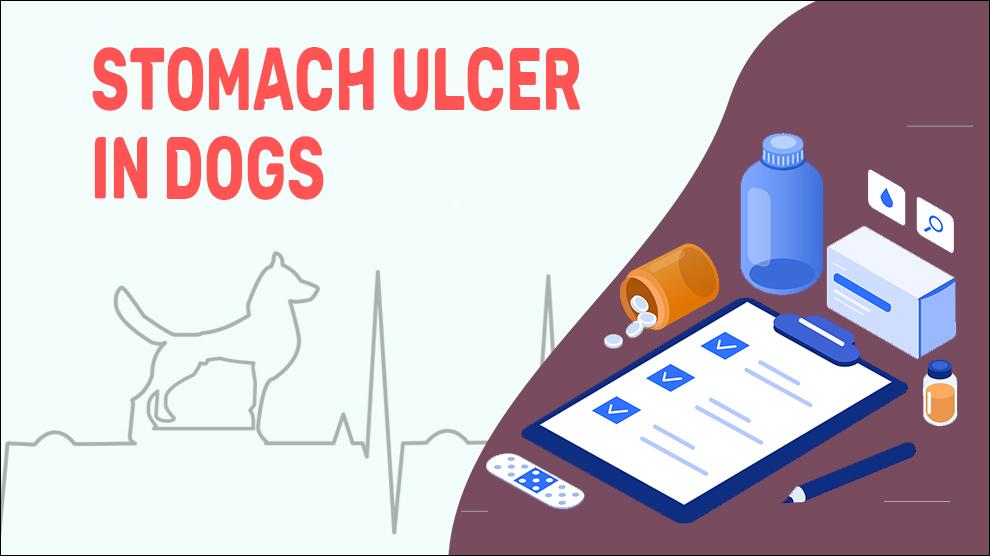What Is Stomach Ulcer In Dogs?
Stomach ulcers happen when the surface layer (mucosal lining) that lines the stomach, becomes disrupted. They are accountable for nutrient absorption and come in direct contact with the luminal contents. The stomach mucosal barrier balances the potential disruptive properties of the luminal contents. Any damages or faults in the normal stomach mucosal barrier and inability to restore itself lead to a continuous cycle of additional mucosal damage.
The stomach's mucosal barrier is a comprehensive defense mechanism made up of epithelial, submucosal, and mucus elements. This defends the normal mucosa from the hostile lumenal environment that can befall the body after eating all types of foodstuffs, the highly acidic environment needed to help break these foodstuffs, and the back-diffusion of hydrogen ions into the mucosa. All the corrosive, acerbic, and even infectious substances are snubbed by this multifaceted mechanism.
Breaching of this barrier allows the bile acids, digestive acids, hydrochloric acid, and proteolytic enzymes to disintegrate the epithelial cells, barge into lipid membranes, and stimulate apoptosis and inflammation.
Mainly, the complications that are often connected with ulcers are not well- understood in dogs. However, stomach ulcers in dogs are more widespread than you would believe. The symptoms of stomach ulcers are inconspicuous and may often be unobtrusive or overlap with other conditions.
Symptoms Of Stomach Ulcer In Dogs
- Lack of appetite / Significant weight loss
- Anxiety or irritability
- Abdominal pain -“bowing” posture often
- Rapid heart rate (tachycardia)
- Black or tarry stools (melena)
- Diarrhea
- Chronic vomiting with or without bleeding (signs of “coffee grounds" -bright red blood or partially digested blood)
- Lethargic behavior (Weakness)
- Dehydration
- Excessive drooling
- Pale gums
Treatment Options For Stomach Ulcer In Dogs
The Treatment modality is based upon the underlying cause and severity/extent of the problem.
Medications: Gastro-protectant medications and Acid-blocking medication.
Antacids: Calcium carbonate, aluminum hydroxide, etc.
Proton-pump inhibitors (PPIs): Omeprazole, esomeprazole, pantoprazole, lansoprazole etc.
Histamine type-2 receptor antagonists (H2RAs): Ranitidine, famotidine, cimetidine, and nizatidine.
Prostaglandin E1 analog: If NSAIDs are required long-term, these medications may be considered. For instance, Misoprostol (Arthrotec, Cytotec). These medications don’t have the harmful gastric effects of NSAIDs.
Home Remedies For Stomach Ulcer In Dogs
Herbs
Supplements to achieve optimal gut health: Chalcone, L-glutamine, quercetin, and probiotics
Glycyrrhizin stripped Licorice: Natural corticosteroid
Slippery elm: Ulmas Rubra. This is used to ease acid reflux
Aloe vera: Anti-inflammatory agent for stomach ulcer
Echinacea: Purple coneflower, to support the immune system
Alfalfa: Natural diuretic
How To Prevent Stomach Ulcer In Dogs?
- Protect your dog from ingestion of toxins/chemicals, hyperacidity, and infections.
- Avoid usage of pain relievers (NSAIDs) regularly for dogs.
- Extreme physical activity for outdoor dogs can increase stomach acid.
- Take care of your dog's diet to manage the surplus production of stomach acid.
Affected Dog Breeds Of Stomach Ulcer
- There is no breed predisposition.
- However, sled dogs, athletic breeds, Rottweiler, and German Shepherd are more reported.
Causes And Prognosis For Stomach Ulcer In Dogs
1. Causes:
- Adenocarcinoma (tumor in epithelial tissue)
- Addison's disease
- Allergies/ Adverse drug reaction
- Certain drugs, especially long-term medications like NSAIDs or corticosteroids
- Chronic gastritis
- Gastrinoma (tumor in the pancreas or duodenum that stimulates gastrin secretion)
- Exposure to poison or toxin
- Hyperacidity of the stomach
- Helicobacter pylori (inflammation in the lining of the stomach)
- Hepatopathy (vacuoles develop in the liver)
- Irritable bowel syndrome
- Liver or kidney disease
- Lymphoma
- Mast cell tumors
- Pancreatitis- inflammation of the pancreas
- Other gastrointestinal tumors
2. Diagnosis:
- Complete blood count/ serum chemistry profile
- ACTH stimulation test
- Liver function test
- Surgical biopsy
- Gastroscopy
- Ultrasound
3. Mortality:
The mortality rate for canine stomach ulcers has decreased modestly in the last few decades.
Only pets with perforated stomach ulcers and peritonitis are in danger, that too if left untreated.
4. Prognosis:
The prognosis is good for stomach ulcers given that the underlying cause can be treated successfully.
If there have been kidney or liver complications, the prognosis may be more guarded. When tumors or abnormal cell growth are reasons for the ulcer, the prognosis will depend upon the elimination of the tumor and overall the health condition of your pet.
When To See A Vet For Stomach Ulcer In Dogs?
Contact your vet immediately, if you notice any of these signs.
In severe cases of ulcers in dogs:
- Anemia
- Blood in vomiting (hematemesis)
- Disorientation
- Loss of consciousness
- Shock
Food Suggestions For Stomach Ulcer In Dogs
- Start with bland, non-spicy, soft, and easily digestible foods and slowly Increase the frequency of feedings.
- Feeding small meals often (but not overfeeding) will satiate your dog and stops corrosive acids from irritating the mucosal lining.
- White or processed foods, salty foods, fatty meats, hard treats, and kibbles should be cut off.
What to feed?
- Bland diet: Boiled chicken, cooked rice, lean tender meats, low-fat cottage cheese, bone broth, canned tuna, boiled hamburger, etc.
- Provide easily digestible lean cuts of meat. Beef, pork, fish, and poultry (cooked and drained of excess fat).
- Boiled, poached eggs / tender calves liver, roast beef, lamb chop,/ Meat-flavored baby food.
- Cooked, canned, or frozen vegetables.
- High-fiber foods: Chickpeas, Lentils, boiled green peas, cereal, green beans, peas, and Tender cooked vegetables.
Conclusion
When there is an underlying cause for your dog’s stomach ulcer, such as cancer, infection, or any other disease, then your vet may suggest further diagnosis as that condition must be treated successfully besides the stomach ulcer itself. When treated appropriately, a stomach ulcers won't cause any threat to the pet’s life in most cases.

















